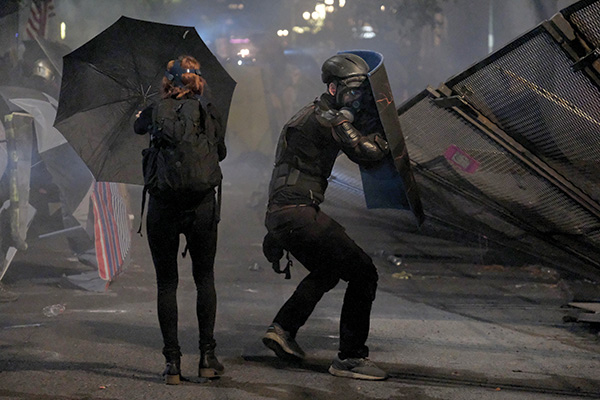Behind the Black Umbrellas
Debating Violence with Portland's Antifa
This article was published in the Spring, 2021 print edition of Plough Quarterly.
“What’d you see?” a man shouted. Around him, a crowd of black-clad activists gathered outside the Multnomah County Democrats building in northeast Portland, Oregon the Sunday night after the election.
“You didn’t see shit!” the protesters chanted in response. Several people with hammers, rocks, and cans of spray paint broke windows of the building and tagged it – “Fuck Biden” “ACAB” “BLM”. Others opened black umbrellas, shielding the vandals from security cameras and passersby. The chanting continued, “Whose lives matter? Black Lives Matter!” and “All Cops Are Bastards”(to the tune of “nana nana boo boo”). Two men with drums kept rhythm for the chants. Within minutes, most of the windows were broken and the group was on the move again, back through neighborhood streets towards Laurelhurst Park.
Conservatives and liberals seemed to be living in alternate universes, with the same timelines but different facts.
During summer 2020, as my hometown was front and center in the national news, I found that my idea, and other Portlanders’, about exactly what was going on was largely determined by what media we relied on: conservatives and liberals seemed to be living in alternate universes, with the same timelines but different facts. After one more argument about whether downtown Portland was actually “on fire,” I decided to begin attending and reporting on the nightly demonstrations.
Related Articles
Published in Public Discourse
When I interviewed people at Portland’s protests, I found that they rarely hold the views they are attacked for. They are usually not filled with hate, as their opponents believe. However, they often consume one-sided media and are victims of confirmation bias. They believe they know what their adversaries support, and are ready to fight to oppose it.
Published in Breaking Ground
On a hot Tuesday evening in the end of June, I sat at the desk in my upstairs bedroom and discussed the current political situation with a couple of my former students over Zoom. The sounds of the neighborhood—crickets, car horns, and people chatting—drifted in through the open window next to me. Suddenly, an amplified voice joined the other sounds—“this has been deemed an unlawful disturbance. “Disperse immediately”—so loudly that I thought it was coming from the neighbor’s backyard.
